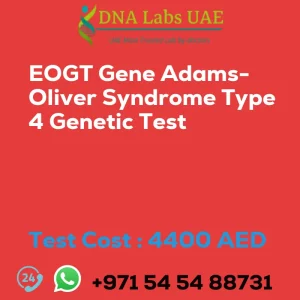PARN Gene Pulmonary Fibrosis and/or Bone Marrow Failure Telomere-Related Type 4 Genetic Test
Test Name: PARN Gene Pulmonary fibrosis and/or bone marrow failure telomere-related type 4 Genetic Test
Components: Blood or Extracted DNA or One drop Blood on FTA Card
Price: 4400.0 AED
Sample Condition: Blood or Extracted DNA or One drop Blood on FTA Card
Report Delivery: 3 to 4 Weeks
Method: NGS Technology
Test type: Osteology Dermatology Immunology Disorders
Doctor: Dermatologist
Test Department: Genetics
Pre Test Information: Clinical History of Patient who is going for PARN Gene Pulmonary fibrosis and/or bone marrow failure, telomere-related, type 4 NGS Genetic DNA Test. A Genetic Counselling session to draw a pedigree chart of family members affected with PARN Gene Pulmonary fibrosis and/or bone marrow failure, telomere-related, type 4 NGS Genetic DNA Test gene PARN
Test Details:
The PARN gene is associated with a condition called pulmonary fibrosis and/or bone marrow failure, which is telomere-related. This condition is referred to as type 4 NGS (Next-Generation Sequencing) genetic test.
Pulmonary fibrosis is a progressive lung disease characterized by the formation of scar tissue (fibrosis) in the lungs, leading to difficulty in breathing and reduced lung function. Bone marrow failure, on the other hand, refers to the inability of the bone marrow to produce enough healthy blood cells, leading to a deficiency in red blood cells, white blood cells, and platelets.
Telomeres are protective caps at the ends of chromosomes that gradually shorten with each cell division. In telomere-related disorders, such as pulmonary fibrosis and bone marrow failure, there is an abnormal shortening of telomeres, which affects the function and lifespan of cells.
Type 4 NGS genetic testing refers to the use of next-generation sequencing techniques to analyze the DNA sequence of the PARN gene. This test helps identify any mutations or variations in the PARN gene that may be responsible for the development of pulmonary fibrosis and/or bone marrow failure.
Genetic testing for type 4 NGS can be helpful in diagnosing individuals with these conditions, as well as in identifying carriers of PARN gene mutations who may be at risk of passing the condition on to their children. It can also aid in the management and treatment of affected individuals by providing insights into the underlying genetic cause of the disease.
It is important to note that genetic testing should be performed under the guidance of a healthcare professional or genetic counselor who can provide appropriate counseling and interpretation of the results.
| Test Name | PARN Gene Pulmonary fibrosis andor bone marrow failure telomere-related type 4 Genetic Test |
|---|---|
| Components | |
| Price | 4400.0 AED |
| Sample Condition | Blood or Extracted DNA or One drop Blood on FTA Card |
| Report Delivery | 3 to 4 Weeks |
| Method | NGS Technology |
| Test type | Osteology Dermatology Immunology Disorders |
| Doctor | Dermatologist |
| Test Department: | Genetics |
| Pre Test Information | Clinical History of Patient who is going for PARN Gene Pulmonary fibrosis and/or bone marrow failure, telomere-related, type 4 NGS Genetic DNA Test. A Genetic Counselling session to draw a pedigree chart of family members affected with PARN Gene Pulmonary fibrosis and/or bone marrow failure, telomere-related, type 4 NGS Genetic DNA Test gene PARN |
| Test Details |
The PARN gene is associated with a condition called pulmonary fibrosis and/or bone marrow failure, which is telomere-related. This condition is referred to as type 4 NGS (Next-Generation Sequencing) genetic test. Pulmonary fibrosis is a progressive lung disease characterized by the formation of scar tissue (fibrosis) in the lungs, leading to difficulty in breathing and reduced lung function. Bone marrow failure, on the other hand, refers to the inability of the bone marrow to produce enough healthy blood cells, leading to a deficiency in red blood cells, white blood cells, and platelets. Telomeres are protective caps at the ends of chromosomes that gradually shorten with each cell division. In telomere-related disorders, such as pulmonary fibrosis and bone marrow failure, there is an abnormal shortening of telomeres, which affects the function and lifespan of cells. Type 4 NGS genetic testing refers to the use of next-generation sequencing techniques to analyze the DNA sequence of the PARN gene. This test helps identify any mutations or variations in the PARN gene that may be responsible for the development of pulmonary fibrosis and/or bone marrow failure. Genetic testing for type 4 NGS can be helpful in diagnosing individuals with these conditions, as well as in identifying carriers of PARN gene mutations who may be at risk of passing the condition on to their children. It can also aid in the management and treatment of affected individuals by providing insights into the underlying genetic cause of the disease. It is important to note that genetic testing should be performed under the guidance of a healthcare professional or genetic counselor who can provide appropriate counseling and interpretation of the results. |








